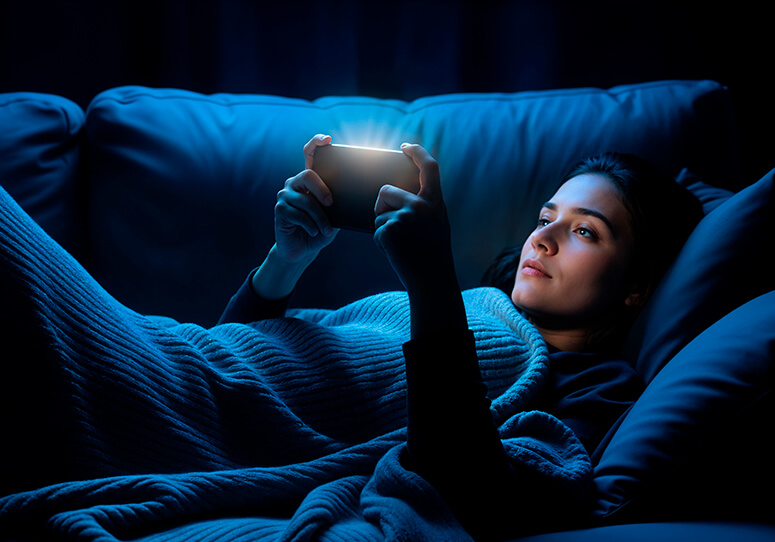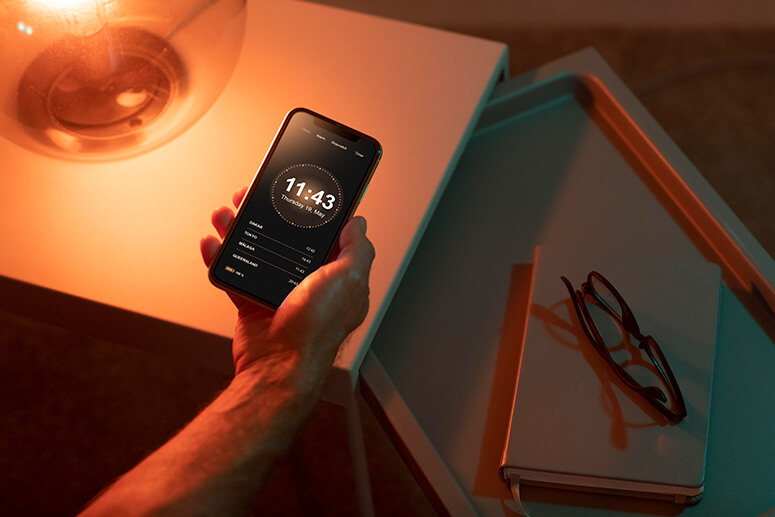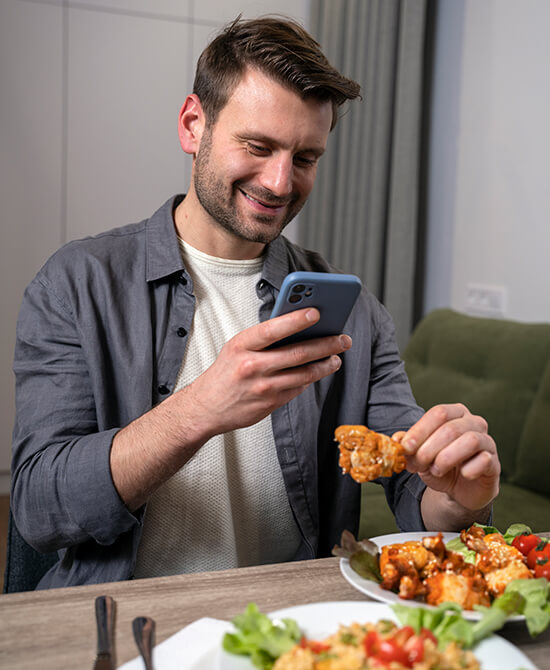When screen time becomes a silent thief
Ever woken up from much-needed sleep only to use the alarm—aka our phones—to scroll on the Internet?
We fall into a rabbit hole, which eventually turns into a morning ritual that subtly consumes us. Then, little do we know hours have already passed.
Being chronically online means becoming insatiable. Our phones serve as the bookends of our days, from our alarm clock to bedtime story—our beds are digital docking stations rather than a place of rest. We let our algorithms feed us with content that makes us stay, be it a new, controversial Twitter thread or a random Chinese micro-drama we did not ask for.
Undoubtedly, our lives are tethered to social media. It is a lifeline for our jobs and relationships, but also a leash when used excessively and unhealthily.
The hard truth is that detoxing fully from social media is almost impossible, especially when our entire lives are attached to it. However, this shall not deter us from reclaiming small acts of rest and resistance amid bed rotting, excessive screen time, and social media spirals.
Late mornings
Clinical psychologist Dr. Marc Eric Reyes explains why we’re constantly tempted to reach for our phones first thing in the morning. “When we wake up, it’s like the brain has been conditioned by the world that there’s a sense of urgency in everything. That you have to urgently know what’s happening in the world.” It becomes a norm that can derail us from doing daily activities and responsibilities.

This looks very similar to bed rot, a popular self-care trend particularly among young adults. This involves staying in bed for extended periods, doing passive activities like scrolling through social media. According to Dr. Reyes, this proliferated during the COVID-19 pandemic, where everything, from alarms to news, was linked to our phones.
Dr. Reyes, also a psychology professor at the University of Santo Tomas, clarifies that passive and extensive scrolling through social media from the moment we wake up is not necessarily a form of bed rotting, but a delaying mechanism from our daily routine. Bed rotting, according to him, is a conscious coping mechanism for those who do not want to get up—they are aware of their lethargic mood.
It is linked to deeper issues like burnout or symptoms of depression, where one does not want to get up because they do not have the energy and motivation to do so.
Studies show that excessive bed rotting may take a hit on one’s physical and mental health, which may likely ruin sleep patterns, increase risks of anxiety and depression, heighten physical inactivity, or increase feelings of isolation, loneliness, or fear of missing out.

“There’s a psycho-dynamic, regressive input to that (...) because the safest environment (was) when you were in your mother’s womb,” says Dr. Reyes. “(You) see the bed as a safe space, as a haven for rest and sleep, and (you) are just tired of the world outside of their bed, that’s why (you) bed rot.”
Meanwhile, automatically reaching for our phones in the morning is an autopilot behavior that delays necessary movements, like preparing breakfast or simply making the bed which is done unknowingly and unplanned at all.
This becomes a bigger problem when we are glued to our screens, not just in the comfort of our beds but also in every menial task we do daily.
Wired routine
Despite being in my early 20s, I consider myself an “iPad kid” who cannot function without a phone. I start my meal not with a prayer but with random online content. Doing the dishes or sweeping the floor takes longer because I become too immersed in whatever long-form article I randomly stumble upon.

In a way, screen time is my form of rest. However, I recently realized that it is not a true mental escape. According to Dr. Reyes, too much screen time could be detrimental since it robs us of quality time and opportunities, and divides our attention. “When you scroll or when you’re on social media, time passes by quickly. You end up missing out on important stuff.”
I feel a sense of pressure and restlessness to consume media content—to be chronically aware, even though no one is directly forcing us to. Knowing what’s trending online inevitably creates a sense of belonging in our social circles. It can be hard to give up screen time because it can be isolating when we are not in the know. For young people, disconnection often feels like social exile; we do not just scroll for content, but for community. But at what expense?
Dr. Reyes compares social media and screen time to money. They are not inherently evil, but the abuse of them becomes a problem.
It’s a double-edged sword. “It made life easier, but it also became deadly because of overuse. So I always say, use social media in moderation,” he advises, adding that today’s generation needs digital etiquette, digital literacy, and digital regulation.
But here is another hard truth: Social media is built to be addictive and inescapable. Tech giants and developers created their platforms to make us stay longer, intentionally inventing features like the algorithm-driven For You Page, infinite scroll, and autoplay to maximize engagement.
As a self-aware iPad kid, seeing my screen time is my wake-up call — I literally have to wake up and get this autopilot routine out of my system.
Anna Lembke, in her book Dopamine Nation, said social media has drugged our instinct to connect. As social beings, our brains release dopamine naturally when we make human interactions. Social media apps exploit this reward system, flooding us with dopamine that somehow mimics the effects of addictive substances like heroin or alcohol. As a result, we become too vulnerable to compulsive overconsumption, overridden by personalized algorithms and intentionally made addictive features.
Giving up screen time is not just a matter of willpower but also about breaking systemic, psychological design patterns.
The joy of missing out
As a self-aware iPad kid, looking into the hours of my screen time is my wake-up call—like I literally have to wake up and get this autopilot routine out of my system. There is something cathartic about deactivating all my social media accounts. For a brief moment, I felt reborn, wrapped in the strange bliss of not knowing.

Reality soon hit me the moment I reactivated my accounts, and I saw the flooded group chats, the overwhelming news that transpired in three days, and the invites I missed out on.
However, “social media detox” is quite a misnomer. Most of us think a detox should be religiously adhered to for more than three days, a week, or even a month. But it could just be an hour in a day or a day in a week of not engaging on social media.
Dr. Reyes made me realize that my one-hour-and-30-minute commute to school could count as a detox. It’s a short period of “me time,” where I’m being mindful of the moment and enjoying the external world.
“It’s a conscious effort not to engage digitally, but engage more face-to-face,” he points out.
Being chronically online gives a person the feeling of being always attuned to and abreast of everything. FOMO, or fear of missing out, is a kind of social anxiety that often stems from unmet social needs, aggravated by social media. In my case, this fear becomes evident whenever I can’t hop into conversations about the latest pop culture references or simply being silent and dumbfounded about the latest sociopolitical issues being discussed online.
To counter FOMO, Dr. Reyes suggested JOMO, or the joy of missing out.
Coined by tech entrepreneur Anil Dash, JOMO means enjoying the freedom of disconnecting by trying to consciously choose what would make us happy and mindful of the present moment.
“The joy of missing out is the joy of detoxing digitally. Even if you don’t log off (completely), you don’t check (social media),” Dr. Reyes explains.
Dr. Reyes suggests that a simple way of developing JOMO is by delaying social media use. He advises going back to the traditional, like using wind-up alarm clocks or getting news from newspapers, to prevent us from reaching for our phones automatically. This may lessen screen time and reset our dopamine reward pathways.
Going cold turkey—fully disconnecting from the digital world—can be too jarring. It can be extremely difficult to resist it in a modern world. Hence, baby steps come a long way. Setting micro-boundaries, like no morning screen time, or setting app limits can be a gentler, more realistic way to reclaim control, all while being mindful of our daily environment.
We can heal and restore without quitting the Internet by just refusing to let it dictate our lives.


